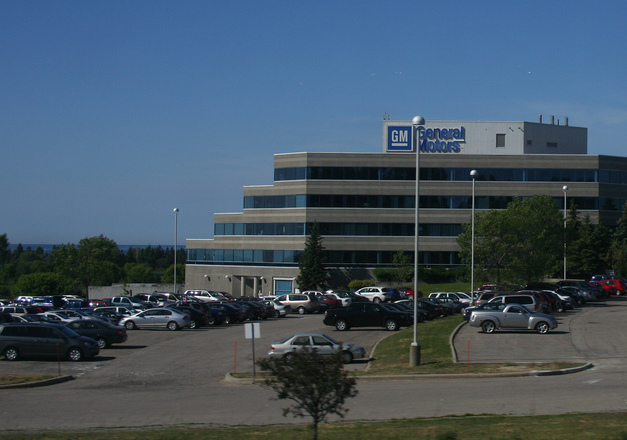Almost as soon as General Motors announced earlier this week it would be closing its Oshawa plant, political leaders in Ottawa and Toronto took to the microphones and social media.
And a Toronto-based journalist proposed a radical idea.
From Ontario Premier Doug Ford to members of the Trudeau government in Ottawa, the messages were similar: There is not much they can do to keep the GM Oshawa jobs. That ship has left the dock, in Ford’s words. But both levels of government did promise to do what they could to help the displaced workers, through enhanced employment insurance and job re-training.
Ford also took gratuitous swipes at the previous provincial Liberal government and the NDP government of the 1990s for their supposedly business-unfriendly policies.
Federal Liberals pointed to the efforts they are making to keep the auto industry in Canada alive, such as the automotive innovation fund.
Speaking in the House of Commons, Innovation, Science and Economic Development Minister Navdeep Bains sighed wistfully that reducing corporate taxes and signing free-trade agreements did not appear to be sufficient to keep good jobs in Canada, let alone create new ones. That’s why the government created the fund, he said, to leverage private investment. And he flaunted a few of its successes.
“Toyota invested over $1 billion, which helped maintain and create 8,500 jobs,” Bains told the Commons. “And the same thing with Honda. (The fund) was able to secure $492 million, which helped secure 4,000 good quality middle-class jobs.”
The NDP’s Nathan Cullen was not impressed. He pointed out that just days ago the Trudeau government’s Fall Economic Update offered significant tax breaks to corporations to encourage investment. And how did GM respond? In the MP’s words: “Last week, the Liberals gave companies like General Motors $14 billion in tax giveaways, saying it would protect jobs here in Canada. Less than five days later, GM announced its plan to close its Oshawa plant, shattering the lives of more than 5,000 families.”
Billions for bailout – where’s the accountability?
Cullen, like many others, also pointed to the generous financial support Canada has provided GM going back to the 2009 bailout, which helped rescue the company from certain bankruptcy.
“In 2009, the Canadian and Ontario governments loaned GM $9.5 billion and acquired some of its shares. Then, it ended up losing almost $3 billion,” Cullen said. “In 2014, the Auditor General of Canada found out that GM could not account for how more than half a billion dollars of that money was used. In October, Export Development Canada showed a $1-billion outstanding loan to General Motors that now apparently is going to be written off.”
With all of these billions of dollars going to profitable corporations, Canadians are wondering where the accountability is, the B.C. MP said.
Conservatives do not question the advisability of corporate giveaways and bailouts. The GM bailout happened on former prime minister Stephen Harper’s watch. Indeed, Conservatives want the current government to double down on the corporate welfare policy by cutting corporate taxes even further, cancelling the carbon tax and even removing the tariffs Trudeau imposed in retaliation to U.S. steel and aluminum tariffs.
As Ontario Conservative MP John Brassard put it, “our retaliatory steel and aluminum tariffs would be better removed at this point to allow us to be more competitive.”
The NDP’s main constructive proposal is for a national automotive strategy.
The party’s London MP, Irene Mathyssen, said that a “cohesive, well-thought-out strategy would attract investment, support research and engineering, support innovation and sustain good jobs.”
That strategy, she explained, “would begin by convening an auto summit with provincial, municipal, industry leaders and labour, and labour is constantly forgotten in this scenario.”
It was left to a non-politician, Toronto Star business writer David Olive, to propose the most radical and far-reaching solution — a publicly owned Canadian automaker. Canada is one of the very few car-making regions without an automaker of its own, Olive wrote. He suggested the government nationalize GM’s Canadian operation.
“Nationalizing GM Canada is a compelling proposition. It would not only save jobs, but also create them, as Canada repatriated the engineers, designers and experts in advanced manufacturing who have been obliged to make their careers abroad. It would be a significant advance in economic sovereignty, in a Canada that is stunted by its status as the world’s biggest branch-plant economy.”
Years ago, a wing of the NDP used to propose that sort of measure, frequently decrying the colonized nature of Canada’s branch-plant economy. Indeed, the idea of using public ownership in key sectors as an instrument of policy was once shared virtually across the political spectrum in Canada.
The Conservatives created the CBC in the 1930s and the Liberals created Petro-Canada in the 1970s, in part, by buying the Canadian assets of foreign-owned companies.
Perhaps the evident failure of the currently fashionable strategy of corporate bribery to foster environmentally and economically sustainable private investment will encourage political leaders to once again consider the idea of public ownership.
Photo: Robert Taylor/Flickr
Karl Nerenberg has been a journalist and filmmaker for more than 25 years. He is rabble’s politics reporter.
Help make rabble sustainable. Please consider supporting our work with a monthly donation. Support rabble.ca today for as little as $1 per month!



